The healthcare industry is rapidly evolving, with a growing emphasis on patient-centric care and streamlined operations. In this dynamic landscape, Customer Relationship Management (CRM) software has become indispensable for healthcare organizations seeking to enhance patient engagement, improve communication, and optimize workflows.
A specialized CRM solution designed for the unique needs of the healthcare industry can significantly impact patient satisfaction and overall efficiency.
Here are the top seven CRM software solutions tailored specifically for the healthcare industry, along with their introduction, pros and cons, and key features:
1. Salesforce Health Cloud

Salesforce Health Cloud is a comprehensive CRM platform designed explicitly for healthcare organizations. It offers a 360-degree view of patient data, enabling healthcare professionals to deliver personalized care and make informed decisions.
With advanced analytics and AI capabilities, Health Cloud provides predictive patient outcomes and fosters seamless communication among healthcare teams.
Pros:
1. Comprehensive platform with a 360-degree view of patient data.
2. Advanced analytics and AI capabilities for predictive patient outcomes.
3. Seamless integration with other Salesforce products for a unified ecosystem.
4.Scalable and suitable for large healthcare organizations.
5. Strong security features and compliance with healthcare regulations.
Cons:
1. High initial setup and customization costs.
2. Steeper learning curve for users not familiar with Salesforce products.
Key Features:
1. Centralized patient records with medical history, treatment plans, and appointments.
2. Real-time collaboration among healthcare teams for efficient patient care.
3. AI-powered personalized patient interactions and predictive analytics.
2. HubSpot Health CRM
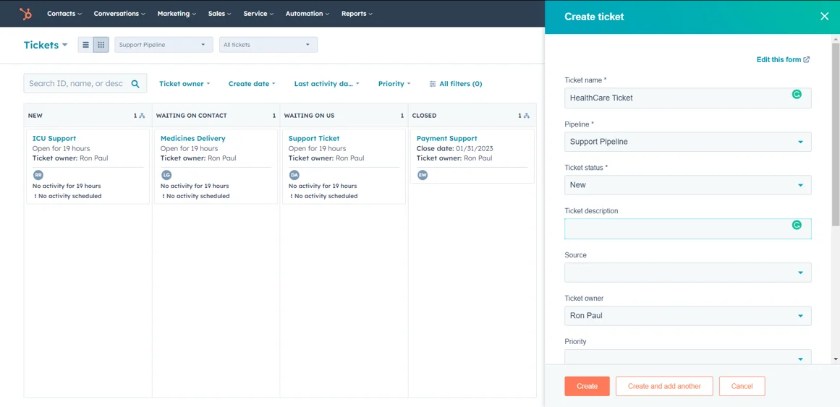
HubSpot Health CRM is a user-friendly and robust solution catering to healthcare organizations of all sizes. The software focuses on building strong patient relationships through targeted marketing, personalized communication, and automated processes.
HubSpot’s intuitive interface allows healthcare providers to manage patient information, track interactions, and analyze patient engagement easily.
Pros:
1. User-friendly interface with easy customization options.
2. Powerful marketing automation and lead management capabilities.
3. Seamless integration with HubSpot’s marketing and sales tools.
4. Scalable for both small clinics and large healthcare organizations.
5. Affordable pricing plans for different needs.
Cons:
1. Limited advanced analytics compared to other CRM solutions.
2. Some features may require integration with other HubSpot tools.
Key Features:
1. Personalized patient communication through targeted marketing.
2. Marketing automation and email campaigns for patient engagement.
3. Lead management to track patient interactions and follow-ups.
3. Medesk
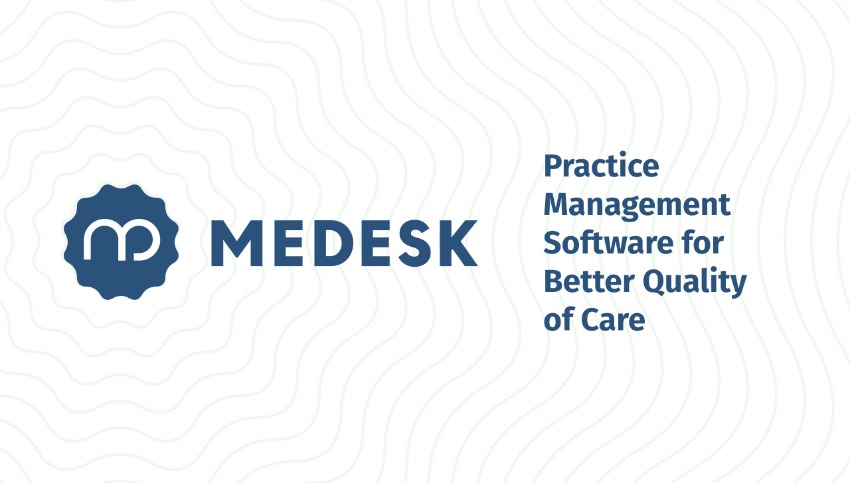
Medesk is a comprehensive cloud-based CRM system designed explicitly for healthcare practices. It streamlines patient management by providing appointment scheduling, electronic health records (EHR) management, and medical billing functionalities.
Medesk’s CRM component enables healthcare professionals to track patient interactions, follow-ups, and communications efficiently.
Pros:
1. Cloud-based solution for easy accessibility and data security.
2. Comprehensive CRM with integrated appointment scheduling and billing.
3. User-friendly interface for streamlined patient management.
4. HIPAA-compliant to meet healthcare data privacy regulations.
Cons:
1. Limited integration options with other third-party tools.
2. May not offer as many advanced features as some other CRM solutions.
Key Features:
1. Integrated appointment scheduling and electronic health records (EHR) management.
2. Efficient patient communication and follow-ups.
3. Compliance with healthcare industry data security standards.
4. Pipedrive for Healthcare

Pipedrive is a versatile CRM software widely used across various industries, and it also offers a specialized solution for the healthcare sector.
Pipedrive for Healthcare focuses on simplifying patient relationship management and optimizing healthcare workflows. The software allows healthcare providers to manage patient data, track interactions, and automate repetitive tasks.
Pros:
1. Highly customizable and easy to adapt to specific healthcare needs.
2. Intuitive user interface with minimal learning curve.
3. Reporting and analytics for valuable insights into patient interactions.
4. Cost-effective solution suitable for small to medium-sized healthcare practices.
Cons:
1. May require integration with other tools for advanced automation.
2. Limited scalability for large healthcare organizations.
Key Features:
1. Efficient patient relationship management and workflow optimization.
2. Tracking patient data, interactions, and appointments.
3. Seamless integration with other business tools.
5. Greenway Health
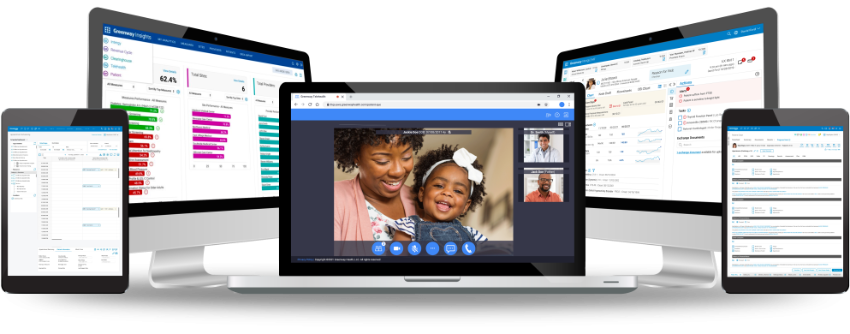
Greenway Health is a comprehensive CRM and EHR solution tailored for healthcare practices. It combines patient relationship management with electronic health record functionalities, providing a unified platform for efficient patient care.
Greenway Health’s CRM component facilitates patient engagement through personalized communication, appointment reminders, and follow-up notifications.
Pros:
1. Unified platform combining CRM and EHR functionalities.
2. Personalized patient engagement through communication and reminders.
3. Comprehensive reporting and analytics for performance evaluation.
4. Suitable for various healthcare practice sizes and specialties.
Cons:
1. Interface may not be as modern or user-friendly as some other CRM solutions.
2. Advanced features may require additional costs.
Key Features:
1. Integrated CRM and EHR functionalities for efficient patient care.
2. Patient communication and appointment reminders.
3. Customizable reporting and analytics.
6. Kareo
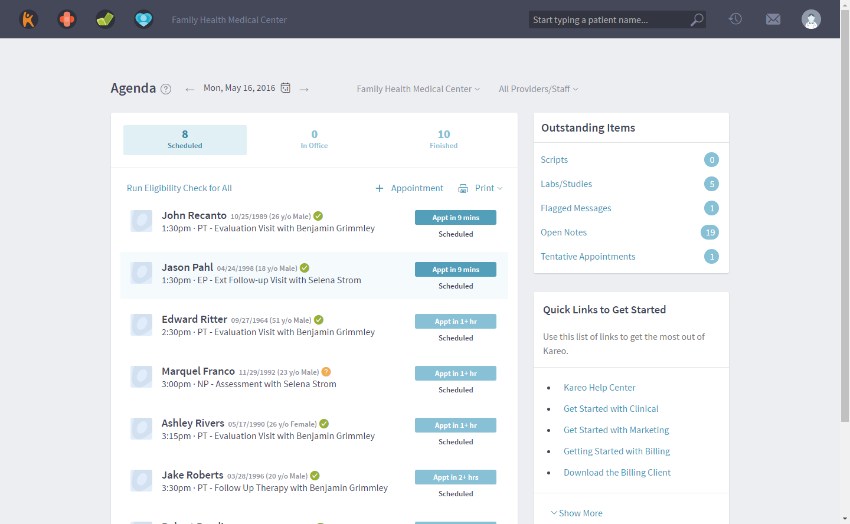
Kareo is a dedicated CRM solution designed specifically for healthcare practices. It simplifies patient communication and follow-up features, seamlessly integrating with other Kareo healthcare management tools.
Kareo’s scalable platform is suitable for practices of different sizes, offering streamlined patient relationship management.
Pros:
1. Dedicated CRM solution designed specifically for healthcare practices.
2. Simplified patient communication and follow-up features.
3. Seamless integration with other Kareo healthcare management tools.
4. Scalable and suitable for practices of different sizes.
Cons:
1. Some users may find the interface less intuitive compared to other CRM solutions.
2. Limited advanced analytics and AI capabilities.
Key Features:
1. Patient relationship management and communication.
2. Integration with Kareo’s other healthcare management tools.
3. Customizable features for efficient patient care.
7. Zoho CRM for Healthcare
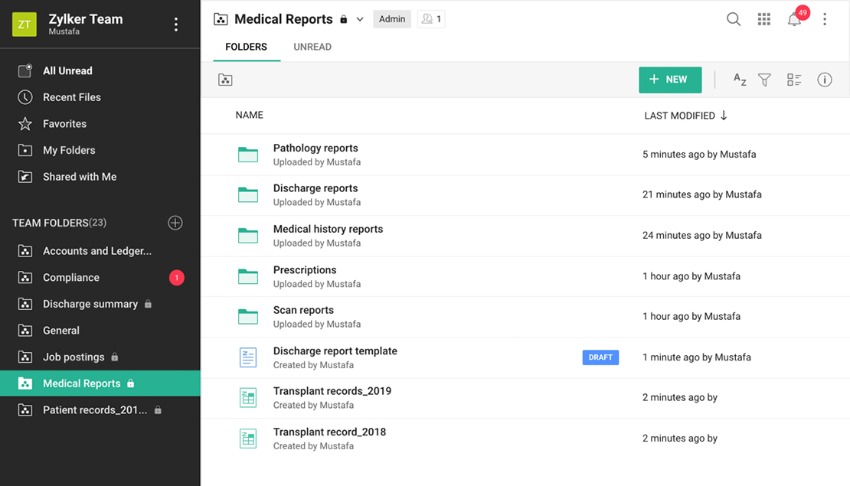
Zoho CRM for Healthcare is a customizable and user-friendly solution. It offers advanced automation features for workflow optimization and seamless integration with other Zoho productivity and business tools.
The platform’s affordable pricing plans cater to various business sizes, making it an attractive option for healthcare organizations.
Pros:
1. Customizable and user-friendly interface.
2. Advanced automation features for workflow optimization.
3. Integration with other Zoho productivity and business tools.
4. Affordable pricing plans for different business sizes.
Cons:
1. Healthcare-specific features may not be as comprehensive as other specialized CRM solutions.
2. Advanced features may require technical expertise for implementation.
Key Features:
1. Customizable patient communication and relationship management.
2. Automation for efficient workflow and patient engagement.
3. Integration with Zoho’s suite of productivity tools.
Conclusion
Selecting the best CRM software for a healthcare organization requires careful consideration of its specific needs, budget, and scalability.
The top seven CRM solutions—Salesforce Health Cloud, HubSpot Health CRM, Medesk, Pipedrive for Healthcare, Greenway Health, Kareo, and Zoho CRM for Healthcare—all offer unique advantages and features tailored to meet the demands of the healthcare industry.









